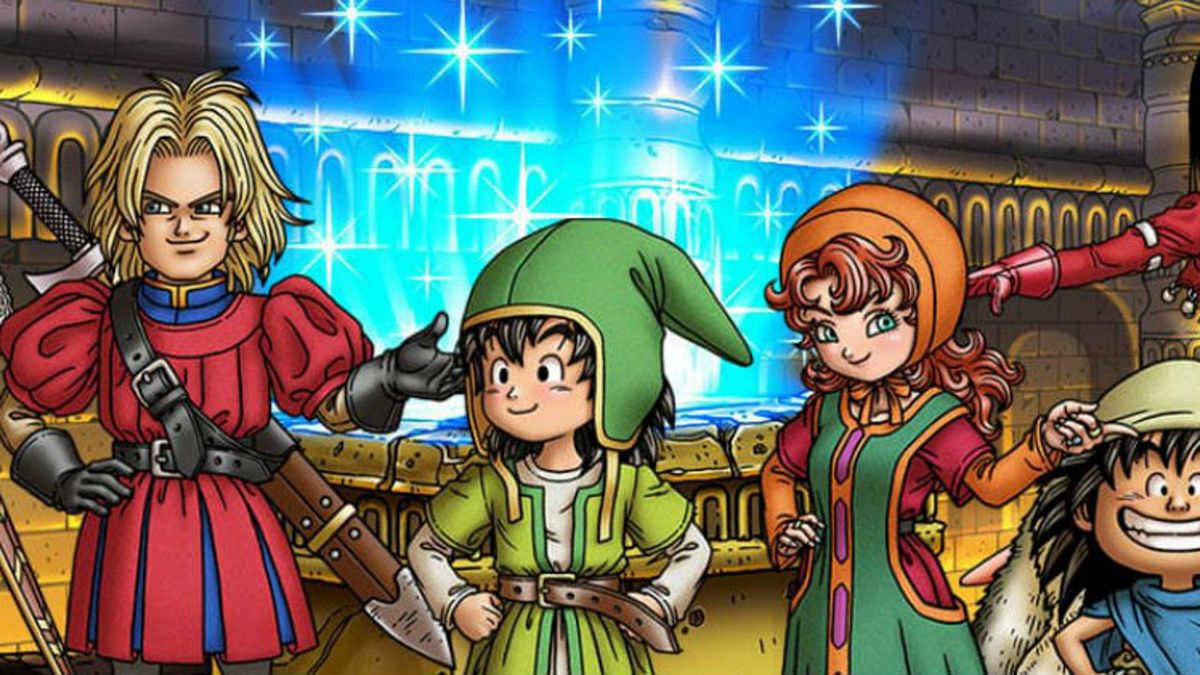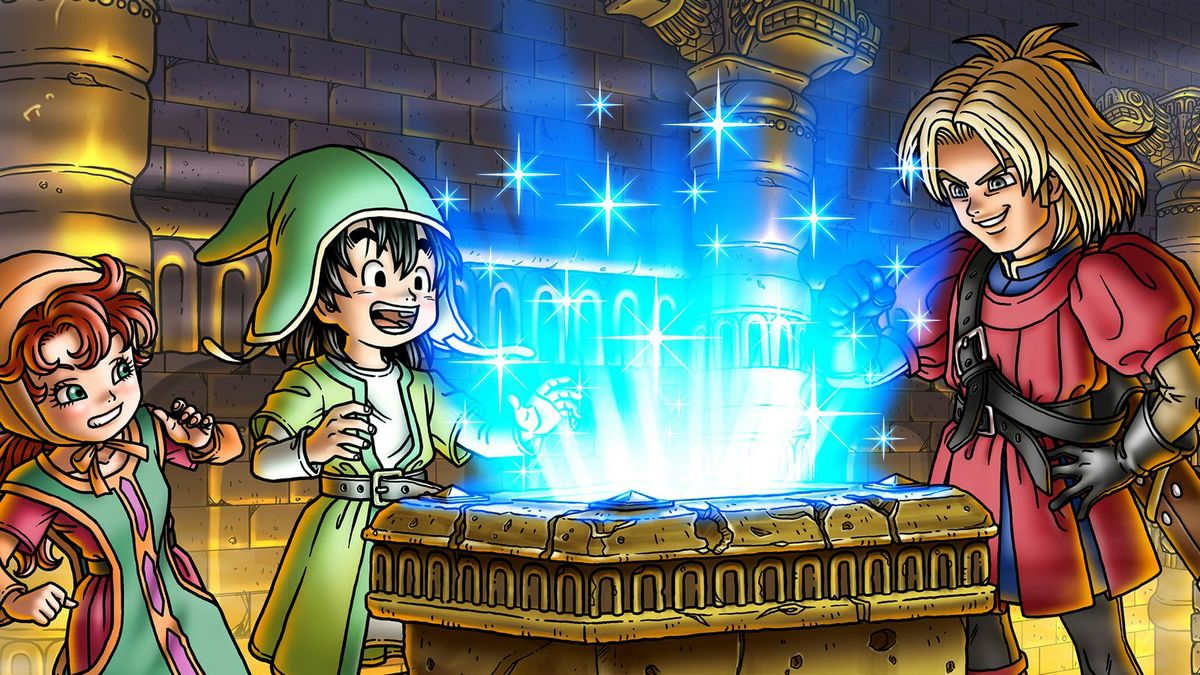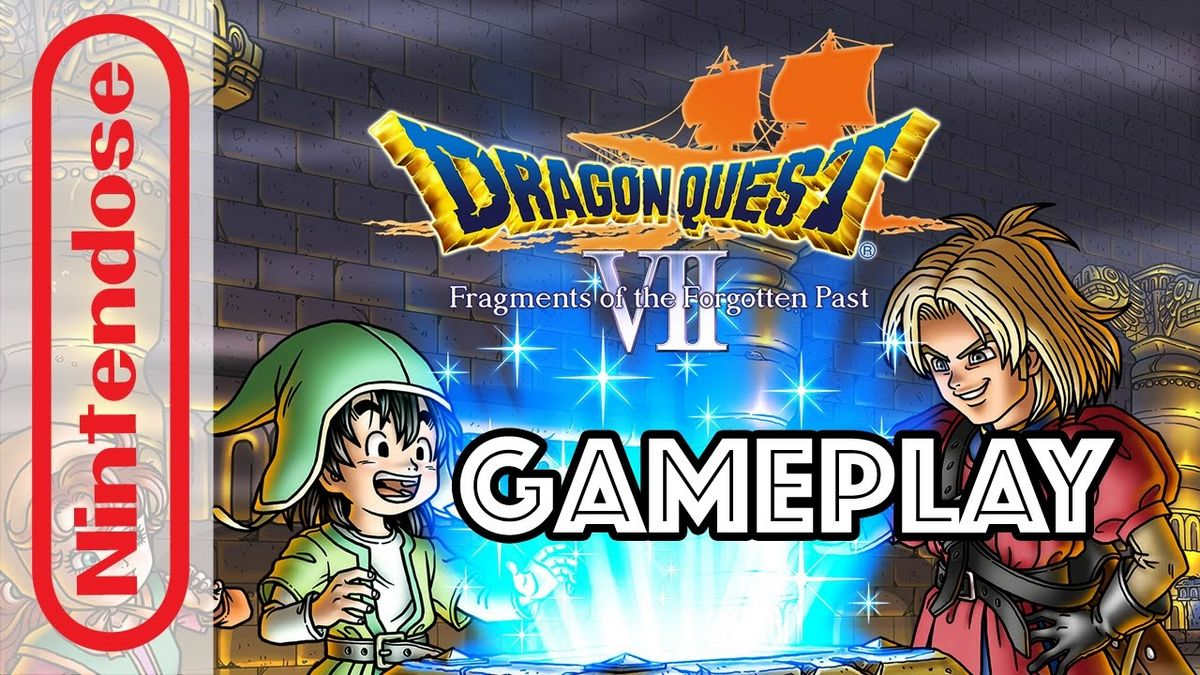Dragon Quest VII: Fragments of the Forgotten Past is a critically acclaimed and beloved Japanese role-playing game that was originally released for the PlayStation console in 2000. Developed by Square Enix, Dragon Quest VII has since been remastered and re-released on several platforms including Nintendo 3DS, Android, and iOS. This immersive RPG takes players on an epic adventure across time to restore lost memories and save the world from destruction.
The game features a richly detailed storyline with a cast of diverse characters, each with their own unique abilities and personalities. Players must navigate a vast open-world filled with treacherous monsters and challenging puzzles while uncovering hidden secrets scattered throughout the various lands they explore.
One of Dragon Quest VII’s most distinctive features is its innovative job system which allows players to customize their characters’ skills as they progress through the game. With over 30 different classes available ranging from spellcasters to warriors, players have near limitless options when it comes to building their ideal party composition.
Overall, Dragon Quest VII: Fragments of the Forgotten Past represents an unforgettable journey into a fantastical world full of adventure, danger, mystery, and wonder – perfect for fans of classic RPGs looking for a deep dive into one of gaming’s most revered franchises.
- Exploring the world of Dragon Quest VII: Fragments of the Forgotten Past
- Understanding the complex job system in Dragon Quest VII: Fragments of the Forgotten Past
- Analyzing the battle mechanics and strategies in Dragon Quest VII: Fragments of the Forgotten Past
- Uncovering hidden secrets and treasures in Dragon Quest VII: Fragments of the Forgotten Past’s vast dungeons
- Evaluating character development and relationships in Dragon Quest VII: Fragments of the Forgotten Past’s narrative
- Examining new features added to Dragon Quest VII: Fragments of the Forgotten Past for its Nintendo 3DS release
- Comparing and contrasting differences between original Japanese version versus Western localization
- Deconstructing how music enhances gameplay experience in Dragon Quest VII: Fragments of the Forgotten Past
Exploring the world of Dragon Quest VII: Fragments of the Forgotten Past
The game is part of the Dragon Quest series, which has been popular among gamers since its first release in Japan in 1986. In this installment, players explore a vast world filled with mysteries waiting to be uncovered.
The gameplay revolves around traveling through different worlds and timelines as you collect fragments of stone tablets that unlock new areas to explore. Along your journey, you will encounter various monsters and engage them in turn-based battles using an intuitive combat system that combines strategy with action elements. As you progress through the story, you’ll recruit new characters with unique abilities who will aid your party on your quest.
One notable aspect of Dragon Quest VII: Fragments of the Forgotten Past is its attention to detail when it comes to storytelling and character development. Each area has its own backstory and history waiting to be discovered, making exploration just as important as combat. Additionally, there are plenty of side quests available for those looking for additional challenges or rewards.
Overall, Dragon Quest VII: Fragments of the Forgotten Past offers a rich gaming experience that caters towards both casual and hardcore RPG fans alike. With engaging gameplay mechanics combined with a well-crafted narrative full of interesting characters and locales to discover; it’s easy see why this title stands out amongst other titles within genre – even after all these years!

Understanding the complex job system in Dragon Quest VII: Fragments of the Forgotten Past
The game features more than 30 jobs, each with its own unique set of abilities and strengths. Players can switch between jobs at any time, allowing them to adapt their party to different situations and challenges.
The job system in Dragon Quest VII also features a skill point system that requires players to carefully allocate points earned through battle or by using special items. This adds a level of strategy and depth as players must balance between upgrading their current abilities or unlocking new ones.
Additionally, some advanced jobs require specific prerequisite jobs before they can be unlocked, adding even more complexity and strategic planning for players. Understanding the intricacies of this job system is crucial for success in battles against tough enemies and bosses.
Overall, Dragon Quest VII’s job system offers immense replayability as players can experiment with different combinations of jobs and abilities on subsequent playthroughs. As such, it remains one of the most rewarding aspects of this timeless classic RPG game.
Analyzing the battle mechanics and strategies in Dragon Quest VII: Fragments of the Forgotten Past
The game features turn-based combat, where players select their party’s actions from a menu of options such as attack, spellcasting, or item usage. Each action has a different effect on enemies depending on their strengths and weaknesses, making it important to analyze enemy types before going into battle.
One key strategy in Dragon Quest VII is to pay attention to character roles and abilities. The game allows players to customize each character’s skills by allocating points earned through leveling up. Players can assign specific roles such as healer or damage dealer for each character based on their abilities.

Another important factor in battles is managing the tension mechanic. By selecting “psyche up” from the menu, characters can increase their tension levels which boosts critical hit rates and damage output but also leaves them vulnerable if they receive attacks while building up tension.
Overall, mastering Dragon Quest VII’s battle mechanics requires careful analysis of enemy types and strategic use of character roles and tensions levels. With dedication and practice, players will be able to overcome even the most challenging foes in this epic adventure.
Uncovering hidden secrets and treasures in Dragon Quest VII: Fragments of the Forgotten Past’s vast dungeons
These dungeons vary in size, complexity, and difficulty level, providing players with an immersive experience that is both challenging and rewarding.
One key strategy for uncovering these hidden secrets and treasures is to thoroughly explore each dungeon. This involves examining every nook and cranny, interacting with all objects within reach including chests, barrels or other containers found scattered throughout the dungeon. It’s also important to keep an eye out for secret passages or hidden rooms which can contain powerful items like weapons or armor upgrades.
Another helpful tip is to engage in battles frequently as enemies often drop valuable loot such as healing items or rare materials used for crafting new equipment. Additionally, certain puzzles within the dungeons may require specific spells or abilities that are obtained through leveling up your characters’ skills.
Overall, exploring Dragon Quest VII’s vast dungeons requires patience and perseverance but it pays off with exciting discoveries which make progressing through the game easier while adding depth to its story-driven gameplay experience.
Evaluating character development and relationships in Dragon Quest VII: Fragments of the Forgotten Past’s narrative
The game follows a group of adventurers who travel through time to restore forgotten fragments of history, leading them on an epic journey that tests their tenacity and bonds with one another.

One notable aspect of the character development in this game is the way each protagonist grows stronger over time as they face increasingly difficult challenges. Their growth isn’t limited to just physical strength but also emotional maturity. This evolution adds depth not only to individual characters but also strengthens their connections with one another, making for more dynamic interactions.
The relationships between characters play a central role in Fragments of the Forgotten Past’s narrative, as each member has unique motivations that drive their actions throughout the adventure. These complexities allow players to see how even minor side quests can impact both individual growth and overall story progression. Through these tasks, players become invested in seeing how these characters overcome obstacles together while deepening their bonds along the way.
In conclusion, evaluating character development and relationships within Fragments of the Forgotten Past provides insight into how these elements elevate gameplay beyond its mechanics alone. By exploring deeper aspects like personal growth amidst adversity or interpersonal dynamics among team members traversing through different periods in history – we are able to grasp what makes it such a beloved RPG title amongst gamers worldwide today!
Examining new features added to Dragon Quest VII: Fragments of the Forgotten Past for its Nintendo 3DS release
The updated version included several new features that enhanced the gameplay and overall experience.
One of the most notable additions to Dragon Quest VII on Nintendo 3DS is the inclusion of StreetPass functionality. Players can now exchange traveler’s tablets with other players they pass by who also have a copy of the game on their system. These tablets contain mini-dungeons that offer unique challenges and rewards not found elsewhere in the game.

Another key feature added to Dragon Quest VII on Nintendo 3DS is an entirely new character class system. Instead of just choosing one class at the beginning of the game, players now have access to over thirty different classes throughout their journey. This allows for greater customization and strategic planning as players can switch between classes to suit different situations.
Finally, Fragments of Forgotten Past saw improved graphics and sound quality compared to its original release. The textures are crisper, animations smoother, and music more dynamic than ever before thanks to utilization advancements made possible by modern hardware technology.
In summary, Dragon Quest VII: Fragments of Forgotten Past underwent substantial updates for its release on Nintendo 3DS including enhanced graphics and sound along with addition fundamental tools such as Streetpass Functionality,and an all-new Character Class System leading long-time fans returning back into this classic RPG franchise while providing newcomers with fresh ways experience what has become one gaming’s greatest classics.
Comparing and contrasting differences between original Japanese version versus Western localization
The original Japanese version and Western localization have several differences in terms of narrative, gameplay mechanics, graphic design, and music. One significant alteration present in the western localization was the use of more modernized language compared to the formal Japanese tone used in the original.
Another major difference between both versions is regarding character portrayal; some characters had their names and personalities altered for local audiences. For instance, Maribel’s personality was considerably changed from her initial rude nature portrayed in Japan to an affable one that appeals better to western cultures’ sensibilities. Additionally, several minor changes were made concerning item translations or even humorous lines added exclusively for Western regions.
The graphics of Dragon Quest VII also underwent few alterations during its transition from Japan to international markets with updated texture designs giving it a fresh look while still maintaining its traditional appeal. Lastly, an overhaul on audio quality was done resulting in dynamic scores that perfectly blend with each scene’s emotion without overpowering dialogue clarity essential for immersive gameplay.
In conclusion, though there are many differences between Dragon Quest VII’s original Japanese version versus Western localization ranging from dialogue variance to character portrayals and graphical updates along with improved music quality making it memorable even after years have passed since its release date around 2000-01 makes this game worth experiencing by any fan who wants a taste of nostalgia combined with new features catering towards contemporary gaming culture preferences.
Deconstructing how music enhances gameplay experience in Dragon Quest VII: Fragments of the Forgotten Past
This game’s soundtrack enhances the gameplay experience in various ways, from setting the mood to enhancing emotions felt during key moments.
The music in Dragon Quest VII is designed to fit seamlessly with the player’s actions and surroundings. The battle theme reflects how intense fights can be by using fast-paced rhythms that sync with each strike. On the other hand, calm melodies set a relaxing atmosphere when exploring towns or villages.
Apart from creating specific moods, this game’s soundtrack also plays a significant role in storytelling. For example, poignant pieces are used during cutscenes that create empathy within players for characters’ experiences or their struggles. Simultaneously, epic orchestral arrangements accompany grand battles against bosses or villains further immerse players into such critical moments.
In conclusion, music has become an integral part of many video games due to its ability to influence overall gameplay experience positively – and Dragon Quest VII: Fragments of the Forgotten Past proves it perfectly by incorporating high-quality soundtracks to enhance both story-telling elements and immersion levels for gamers worldwide!
In conclusion, Dragon Quest VII: Fragments of the Forgotten Past is a game that combines classic RPG elements with modern graphics and mechanics. Its intricate storytelling and character development create an immersive experience for players who are willing to invest time into exploring its vast world.
The game’s use of job classes adds depth to character customization, while the tactical turn-based combat system provides a challenge for both new and experienced players. The addition of quality-of-life improvements such as auto-save and fast travel make it accessible for those who may have struggled with previous entries in the series.
While some may find the pacing slow or repetitive at times, overall Dragon Quest VII: Fragments of the Forgotten Past is a worthy addition to any RPG fan‘s collection. Its attention to detail, rich narrative, and engaging gameplay make it stand out among other titles in its genre.
Read More:- Uncover Mystical Secrets in Game The Forgotten City – A Unique Adventure Experience!.
- Discover the Thrilling World of How to Train Your Dragon Game by DreamWorks – Play Now!.
- Unleash Your Inner Dragon with Epic Adventure in Game Dragon Valor!.
- Discover the Magic of Dragon's Crown: A Thrilling Game with Epic Battles and Stunning Artwork!.
- Experience Epic Battles with Dragon Ball Z: Budokai Tenkaichi – The Ultimate Fighting Game!.
- Revive Nostalgia with Double Dragon Advance: Classic Arcade Game on your Mobile Device!.
- Unleash Your Power with Dragon Ball Z: Shin Budokai – Another Road Game | Buy Now!.